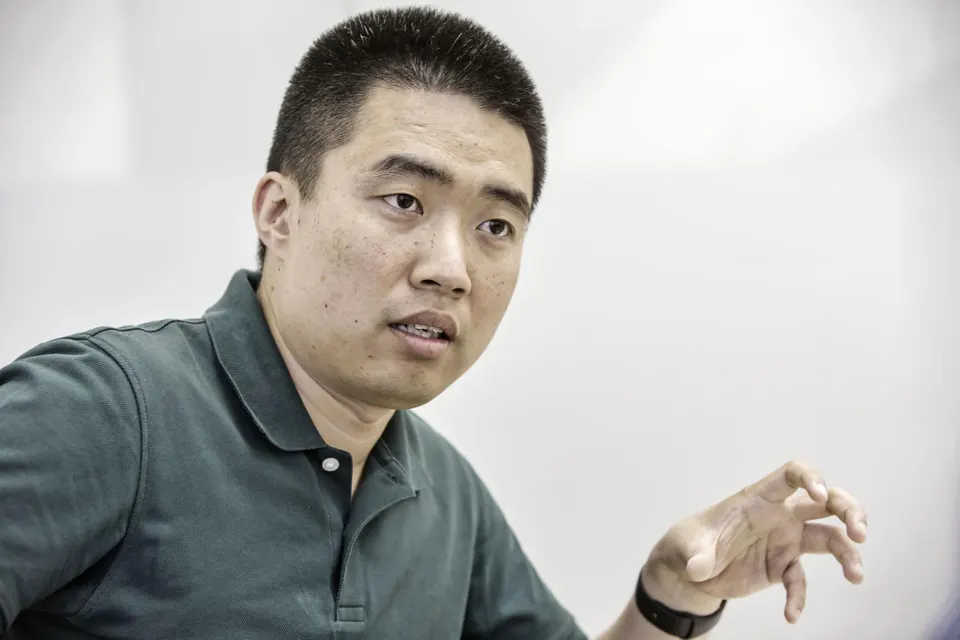- Home
- Billionaires
- Investing Newsletters
- 193CC 1000
- Article Layout 2
- Article Layout 3
- Article Layout 4
- Article Layout 5
- Article Layout 6
- Article Layout 7
- Article Layout 8
- Article Layout 9
- Article Layout 10
- Article Layout 11
- Article Layout 12
- Article Layout 13
- Article Layout 14
- Article Sidebar
- Post Format
- pages
- Archive Layouts
- Post Gallery
- Post Video Background
- Post Review
- Sponsored Post
- Leadership
- Business
- Money
- Small Business
- Innovation
- Shop
Recent Posts
Li Xiang: A Visionary Entrepreneur Shaping the Future of China’s Electric Vehicle Industry

Li Xiang is a name that has become synonymous with innovation and progress in China’s electric vehicle (EV) industry. As the founder and CEO of Li Auto, one of China’s leading EV manufacturers, Li Xiang has built a company that is revolutionizing the way people think about electric cars in China and beyond. His entrepreneurial journey, marked by perseverance and foresight, reflects not only his commitment to a sustainable future but also his drive to make a significant impact on the global automotive landscape.
Born in 1984 in China, Li Xiang grew up in a rapidly changing country that was becoming more industrialized and globalized. From an early age, he displayed an interest in technology and innovation, and his academic background reflects his passion for entrepreneurship and business. He attended Peking University, one of China’s most prestigious universities, where he studied economics. It was during his time at Peking University that Li Xiang began to form the ideas that would later fuel his ventures. His exposure to the fast-growing tech and startup ecosystems in China motivated him to pursue a career that would allow him to combine his business acumen with a vision for the future.
Before founding Li Auto, Li Xiang had already gained valuable experience in the tech and automotive sectors. In 2006, he co-founded his first business, a digital platform designed to help car buyers make informed decisions. While this venture did not achieve the same level of success as his later ventures, it provided him with crucial insights into the automotive industry and laid the groundwork for his future endeavors. In 2015, Li Xiang founded a second company called Cheyipai, a used car trading platform. This company, which he led as CEO, became a significant player in China’s rapidly growing online used car market. Under Li Xiang’s leadership, Cheyipai garnered millions of dollars in investment and built a strong user base.
However, Li Xiang’s true breakthrough came in 2015 when he founded Li Auto, originally known as “Li Xiang Auto.” Li Xiang had identified a gap in the Chinese electric vehicle market. While traditional automakers were beginning to develop electric cars, there was a lack of options that appealed to the average Chinese consumer. Li Xiang’s vision for Li Auto was simple yet ambitious: to create high-quality electric vehicles that were not only environmentally friendly but also affordable and practical for everyday use. He understood that for electric vehicles to truly succeed in China, they needed to be reliable, convenient, and capable of addressing the needs of the modern consumer.
Li Auto’s journey to success has been marked by a relentless focus on technological innovation and a commitment to customer satisfaction. One of the key elements that set Li Auto apart from its competitors is its range-extended electric vehicle (REEV) technology. While most electric vehicles rely solely on batteries for power, Li Auto’s vehicles are equipped with a small gasoline engine that acts as a generator to extend the driving range of the vehicle. This innovative approach has made Li Auto’s vehicles particularly attractive to consumers in China, where concerns over range anxiety have been a significant barrier to the widespread adoption of electric vehicles. By offering a hybrid solution that blends the benefits of both electric and gasoline-powered vehicles, Li Auto has been able to overcome one of the major obstacles to EV adoption.
Li Auto’s first vehicle, the Li ONE, was launched in 2019. The Li ONE, a large SUV with a sleek design and cutting-edge features, quickly became a hit in China’s competitive electric vehicle market. The vehicle’s combination of range, luxury, and affordability made it an appealing choice for Chinese consumers who were looking for an eco-friendly vehicle without sacrificing performance or convenience. The Li ONE was well-received by both consumers and industry experts, and it quickly garnered attention from investors. In fact, Li Auto’s rapid growth and the success of the Li ONE contributed to the company’s decision to go public in 2020. Li Auto’s IPO on the Nasdaq was a significant milestone in the company’s journey, solidifying its position as one of the leading players in China’s electric vehicle market.
Under Li Xiang’s leadership, Li Auto has continued to expand its product line and innovate in the electric vehicle space. In 2021, the company launched the Li L9, a larger and more luxurious SUV designed to compete with high-end electric vehicles from companies like Tesla. The Li L9 has been praised for its advanced technology, including autonomous driving capabilities, and its spacious, high-tech interior. As of 2022, Li Auto is working on introducing more models, including an all-electric vehicle that will further diversify its product lineup and appeal to a broader range of consumers.
Li Xiang’s success in the electric vehicle industry is not just about creating great products; it is also about building a strong brand and a loyal customer base. Li Auto has placed a significant emphasis on creating a seamless customer experience, from purchasing vehicles to providing after-sales service. The company’s direct-to-consumer sales model, which eliminates the need for traditional dealerships, allows it to build a closer relationship with its customers. In addition, Li Auto has invested heavily in developing its own network of charging stations, further enhancing the convenience and accessibility of its vehicles.
Li Xiang’s vision for Li Auto extends beyond the company’s products and services. He has been an advocate for the broader adoption of electric vehicles in China and around the world, and he is committed to reducing the environmental impact of the automotive industry. By providing consumers with affordable, practical, and high-quality electric vehicles, Li Auto is helping to accelerate the global transition to sustainable transportation. As more countries implement stricter environmental regulations and embrace clean energy technologies, companies like Li Auto will play a crucial role in shaping the future of the automotive industry.
In addition to his business ventures, Li Xiang is also known for his leadership style and approach to corporate governance. He has emphasized the importance of building a strong, collaborative team at Li Auto, and he has surrounded himself with talented individuals who share his vision for the company’s future. Li Xiang has been described as a visionary leader with a keen sense of strategy and a willingness to take risks in order to achieve long-term success. His commitment to innovation and excellence has earned him widespread recognition in China and abroad.
Li Xiang’s success story is a testament to the power of entrepreneurship and innovation. His ability to identify a gap in the market and create a product that meets the needs of consumers has made him one of China’s most influential business leaders. As Li Auto continues to grow and evolve, Li Xiang’s leadership will undoubtedly continue to shape the future of the electric vehicle industry, both in China and on the global stage.
- automobile technology
- Automotive Industry
- autonomous driving
- business leader
- business strategy
- Business Success
- car innovation
- car manufacturing
- charging stations
- Cheyipai
- China
- China’s green future
- Chinese automotive companies
- Corporate governance
- Customer Experience
- direct-to-consumer model
- eco-friendly vehicles
- electric car market
- electric mobility
- electric SUV
- electric vehicle adoption
- electric vehicle growth
- electric vehicle industry
- Electric Vehicles
- Entrepreneur
- entrepreneurship in China
- Environmental Sustainability
- EV technology
- Future of Transportation
- global automotive trends
- Green Technology
- hybrid cars
- Innovation
- IPO
- Li Auto
- Li L9
- Li ONE
- Li Xiang
- lithium-ion batteries
- luxury electric vehicles
- Market Expansion
- NASDAQ
- Peking University
- range-extended electric vehicles
- startup success
- sustainable transportation
- SUV
- Technology
- Tesla competitors
- used car trading
- Visionary Leadership
Recent Posts
Categories
- 193 Countries Consortium Partner1
- 193cc Digital Assets2
- 5G1
- Aerospace & Defense48
- AI37
- Arts3
- Banking & Insurance11
- Big Data3
- Billionaires1,506
- Boats & Planes1
- Business332
- Careers13
- Cars & Bikes79
- CEO Network1
- CFO Network17
- CHRO Network1
- CIO Network1
- Cloud10
- CMO Network18
- Commercial Real Estate7
- Consultant1
- Consumer Tech194
- CxO1
- Cybersecurity73
- Dining1
- Diversity, Equity & Inclusion4
- Education7
- Energy8
- Enterprise Tech29
- Events11
- Fintech1
- Food & Drink2
- Franchises1
- Freelance1
- Future Of Work2
- Games149
- GIG1
- Healthcare79
- Hollywood & Entertainment203
- Houses1
- India’s 1000 Richest1
- Innovation46
- Investing2
- Investing Newsletters4
- Leadership65
- Lifestyle11
- Manufacturing1
- Markets20
- Media327
- Mobile phone1
- Money13
- Personal Finance2
- Policy569
- Real Estate1
- Research6
- Retail1
- Retirement1
- Small Business1
- SportsMoney42
- Style & Beauty1
- Success Income1
- Taxes2
- Travel10
- Uncategorized15
- Vices1
- Watches & Jewelry2
- world's billionaires1,475
- Worlds Richest Self-Made Women2
Related Articles
Francis Choi: The Toy Tycoon Behind a Billion-Dollar Empire
Francis Choi Chee-ming, often referred to as Hong Kong’s “King of Toys,”...
By 193cc World's BillionairesJune 6, 2025Francine von Finck and the Legacy of a Discreet Fortune
Francine von Finck, a name that commands respect in elite business circles,...
By 193cc World's BillionairesJune 6, 2025The Life and Legacy of Stefano Pessina
Stefano Pessina, one of the most influential figures in the global pharmaceutical...
By 193cc World's BillionairesJune 6, 2025John Morris: A Life of Vision, Growth, and Legacy
John Morris, the founder of Bass Pro Shops, is an iconic figure...
By 193cc World's BillionairesJune 6, 2025















Leave a comment